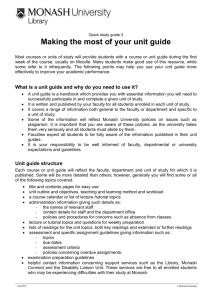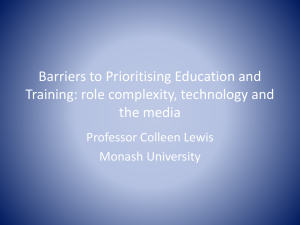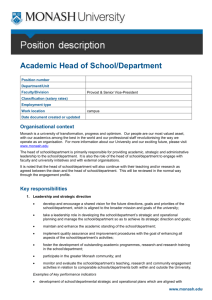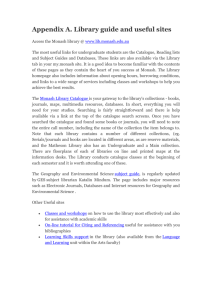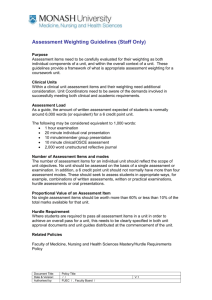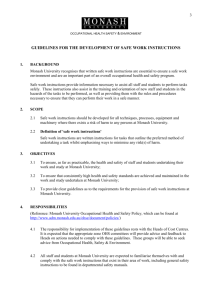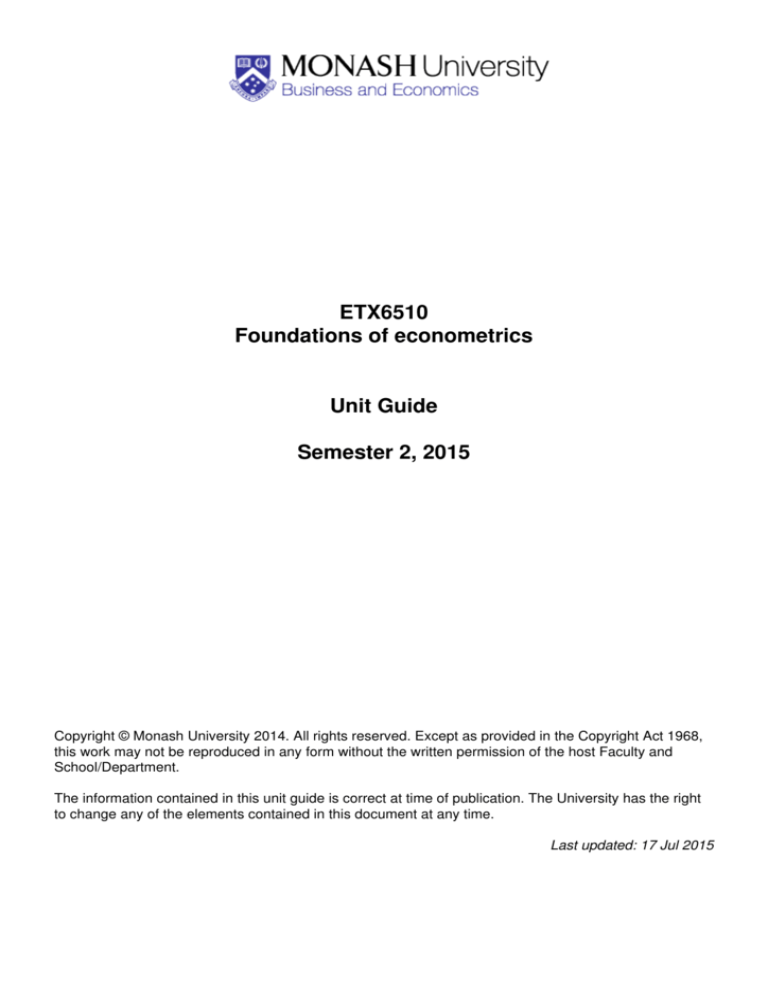
ETX6510
Foundations of econometrics
Unit Guide
Semester 2, 2015
Copyright © Monash University 2014. All rights reserved. Except as provided in the Copyright Act 1968,
this work may not be reproduced in any form without the written permission of the host Faculty and
School/Department.
The information contained in this unit guide is correct at time of publication. The University has the right
to change any of the elements contained in this document at any time.
Last updated: 17 Jul 2015
Table of Contents
ETX6510 Foundations of econometrics - Semester 2, 2015..................................................................1
Mode of Delivery..............................................................................................................................1
Workload requirements....................................................................................................................1
Unit Relationships............................................................................................................................1
Prerequisites........................................................................................................................1
Chief Examiner(s)........................................................................................................................................1
Campus Lecturer(s).....................................................................................................................................1
Your feedback to Us....................................................................................................................................1
Previous Student Evaluations of this Unit....................................................................................................2
Academic Overview...................................................................................................................................3
Learning Outcomes.........................................................................................................................3
Unit Schedule.............................................................................................................................................4
Teaching Approach..........................................................................................................................4
Assessment Summary.....................................................................................................................4
Second marking...................................................................................................................4
Return of final marks............................................................................................................4
Assessment criteria..............................................................................................................4
Assessment Requirements......................................................................................................................5
Assessment Tasks...........................................................................................................................5
Assessment task 1...............................................................................................................5
Assessment task 2...............................................................................................................5
Examination(s).............................................................................................................................................5
Examination 1..................................................................................................................................5
Learning resources......................................................................................................................................5
Feedback to you..........................................................................................................................................5
Assignment submission...............................................................................................................................6
Online submission...........................................................................................................................6
Other Information......................................................................................................................................7
Policies............................................................................................................................................7
Graduate Attributes Policy...................................................................................................7
Student Charter...........................................................................................................................................7
Student services..........................................................................................................................................7
Monash University Library...........................................................................................................................7
Moodle 2......................................................................................................................................................8
Disability Liaison Unit..................................................................................................................................8
ETX6510 Foundations of econometrics - Semester 2, 2015
This unit provides a rigorous treatment of core methods of econometric estimation and inference in a
single and also multiple equation settings. While students are encouraged to look at every problem from
several views (informal, algebraic, geometric, etc.), a large emphasis is placed on constructing formal
arguments, and the importance of clear notation, definitions, assumptions and deductive arguments is
emphasised. Formal lectures and references to graduate level textbooks are provided, and students are
also assigned and encouraged to read some classic journal articles. This unit is designed for PhD
students who intend to write a thesis in econometrics or business statistics. It is not intended for PhD
students in other disciplines who need to learn some quantitative techniques for the empirical section of
their dissertations, although students from other departments who are interested in more advanced
methods may wish to take this unit.
Mode of Delivery
Clayton (Day)
Workload requirements
Minimum total expected workload to achieve the learning outcomes for this unit is 144 hours per
semester typically comprising a mixture of scheduled learning activities and independent study.
Independent study may include associated readings, assessment and preparation for scheduled
activities. The unit requires on average three/four hours of scheduled activities per week. Scheduled
activities may include a combination of teacher directed learning, peer directed learning and online
engagement.
See also Unit timetable information
Unit Relationships
Prerequisites
Students must have successfully completed ETX6500 or BEX6500 to enrol in this unit.
Chief Examiner(s)
Professor Don Poskitt
Campus Lecturer(s)
Your feedback to Us
Monash is committed to excellence in education and regularly seeks feedback from students, employers
and staff. One of the key formal ways students have to provide feedback is through the Student
Evaluation of Teaching and Units (SETU) survey. The University’s student evaluation policy requires that
every unit is evaluated each year. Students are strongly encouraged to complete the surveys. The
feedback is anonymous and provides the Faculty with evidence of aspects that students are satisfied
and areas for improvement.
1
ETX6510 Foundations of econometrics - Semester 2, 2015
For more information on Monash’s educational strategy, see:
www.monash.edu.au/about/monash-directions/ and on student evaluations, see:
www.policy.monash.edu/policy-bank/academic/education/quality/student-evaluation-policy.html
Previous Student Evaluations of this Unit
If you wish to view how previous students rated this unit, please go to
https://emuapps.monash.edu.au/unitevaluations/index.jsp
2
Academic Overview
Learning Outcomes
The learning goals associated with this unit are to:
1. ensure PhD candidates master the core elements of econometrics to be able to generalise and
apply these principles to research questions
2. encourage and train PhD students to grind through complex scholarly journal articles and harvest
the elements needed to conduct research
3. train PhD students in developing a habit of using clear notation and clear arguments in research
work.
3
Unit Schedule
Teaching Approach
Assessment Summary
Within semester assessment: 40%
Examination: 60%
Assessment Task Value
Due Date
TBA
20%
TBA
TBA
20%
TBA
Examination 1
60%
To be advised
Second marking
Where an assessment task is given a fail grade by an examiner, that piece of work will be marked again
by a second examiner who will independently evaluate the work, and consult with the first marker. No
student will be awarded a fail grade for an assessment task or unit without a second examiner confirming
the result.
Note: Exceptions to this are individual pieces of assessment contributing 10% or less of the final mark,
unless the total of such pieces exceeds 30% of the final mark.
Return of final marks
Faculty policy states that 'the final mark that a student receives for a unit will be determined by the Board
of Examiners on the recommendation of the Chief Examiner taking into account all aspects of
assessment'.
The final mark for this unit will be released by the Board of Examiners on the date nominated in the
Faculty Calendar. Student results will be accessible through the my.monash portal.
Assessment criteria
Assessment Criteria Grading Descriptors available at:
http://www.policy.monash.edu/policy-bank/academic/education/assessment/
4
Assessment Requirements
Assessment Tasks
•
Assessment task 1
Title:
TBA
Due date:
TBA
Details of task:
Weighting/Value:
20%
Estimated return date:
•
Assessment task 2
Title:
TBA
Due date:
TBA
Details of task:
Weighting/Value:
20%
Estimated return date:
Examination(s)
• Examination 1
Weighting:
60%
Length:
Type (open/closed book):
Electronic devices allowed in the exam:
None
Learning resources
Monash Library Unit Reading List (if applicable to the unit)
http://readinglists.lib.monash.edu/index.html
Feedback to you
Types of feedback you can expect to receive in this unit are:
5
Assessment Requirements
Assignment submission
Online submission
If Electronic Submission has been approved for your unit, please submit your work via the learning
system for this unit, which you can access via links in the my.monash portal.
6
Other Information
Policies
Monash has educational policies, procedures and guidelines, which are designed to ensure that staff and
students are aware of the University’s academic standards, and to provide advice on how they might
uphold them. You can find Monash’s Education Policies at:
www.policy.monash.edu.au/policy-bank/academic/education/index.html
Key educational policies include:
• Student Academic Integrity Policy and Student Academic Integrity: Managing Plagiarism and
Collusion Procedures ;
• Assessment in Coursework Programs;
• Special Consideration;
• Grading Scale;
• Discipline: Student Policy;
• Academic Calendar and Semesters;
• Orientation and Transition; and
• Academic and Administrative Complaints and Grievances Policy.
Graduate Attributes Policy
http://www.policy.monash.edu/policy-bank/academic/
education/management/monash-graduate-attributes-policy.html
Student Charter
www.opq.monash.edu.au/ep/student-charter/monash-university-student-charter.html
Student services
The University provides many different kinds of support services for you. Contact your tutor if you need
advice and see the range of services available at http://www.monash.edu.au/students
You can also access important information from the Faculty of Business and Economics current students
page http://www.buseco.monash.edu.au/student/
Caulfield and Clayton students wishing to further develop English language skills in a fun group
environment can join a Conversational English Program. You can access these programs at
http://www.monash.edu/students/conversational-english/
Monash University Library
The Monash University Library provides a range of services, resources and programs that enable you to
save time and be more effective in your learning and research. Go to www.lib.monash.edu.au or the
library tab in my.monash portal for more information.
7
Other Information
Moodle 2
All unit and lecture materials, plus other information of importance to students, are available through the
virtual learning environment Moodle site. You can access Moodle via the my.monash portal.
Where to go for help
If you're stuck, confused or simply not sure how to approach Moodle, there are a number of Moodle
resources that you can tap into.
Disability Liaison Unit
Students who have a disability or medical condition are welcome to contact the Disability Liaison Unit to
discuss academic support services. Disability Liaison Officers (DLOs) visit all Victorian campuses on a
regular basis.
• Website: http://www.monash.edu/equity-diversity/disability/index.html
• Telephone: 03 9905 5704 to book an appointment with a DLO;
• Email: dlu@monash.edu
• Drop In: Equity and Diversity Centre, Level 1, Building 55, Clayton Campus.
8


